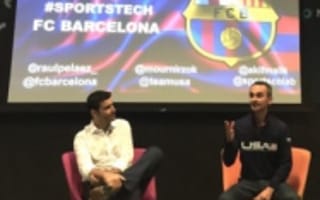By Fredric Paul
“You might be surprised that a soccer club is creating software, but FC Barcelona now has 20 people” working on its proprietary sports technology and analytics project, according to Raúl Peláez, head of sports technology for the famed Catalonian football club.

Raúl Peláez (left) and Mounir Zok
Critically, this isn’t about stadium tech or websites. Raúl—who is in charge of technology that helps athletes reach their full potential—described Barça’s technology and analytics efforts in a special event hosted last week at New Relic’s San Francisco headquarters. (New Relic has long supported the links between technology, sports, and analytics—our customers include Major League Baseball Advanced Media, Major League Soccer, VenueNext, Bleacher Report, Under Armor, and more. And, of course, our European Development Center is located in Barcelona.)
Organized by startup accelerator Sports Colab. Raúl’s conversation with Mounir Zok, head of technology and innovation for the United States Olympic Committee (TeamUSA), was the first time Barça has ever done a public presentation in Silicon Valley.
It’s about time, if you ask me, because the Valley could learn a thing or two from what Raúl and Barça are doing to help athletes and coaches reach their full potential. Here are 10 of the most interesting things I learned from their hour-long discussion and Q&A:
- Leverage your particular advantages. FC Barcelona isn’t just a world leader in soccer, it’s also setting the pace in leveraging technology, data, and analytics among its professional teams in five different sports, including futsal, team handball, roller hockey, and basketball. “We can learn things from hockey to use in soccer,” Raúl said. That’s important, because unlike many of its biggest competitors, Barça doesn’t have a billionaire owner and can’t always match the spending of clubs like Manchester United or Bayern Munich. “We have to compete with talent, and invest in the creating and development of that talent.”
- Focus on process over results. “I don’t believe in KPIs in soccer,” Raúl said. “Moneyball doesn’t help in soccer.” One reason is that there are 22 players in a very big space, and the action stops only every 45 minutes, making analysis very complex. Some players don’t score well on any conventional metrics, but are still one of the best players on the side. Worse, one error can change everything, Raúl noted. You can win all the metrics and still lose the game … “the only KPI is the score.”
- Find the metrics that matter. As part of its ongoing quest to reduce injuries, Barça worked hard to connect player metrics with injury risks. Surprisingly, Raúl said, the only data they found that correlated with injury prevention was player weight. Injuries were more likely when a player weighed in significantly above or below normal weight, but nothing else seemed to make a difference.
- Mobile is everything. Given that they’re all Millennials, Raúl said, “the best way to involve players is via their phones.” That’s why Barça puts the analytics and other info on apps their players use for training, and have with them all the time.
- Take advantage of competition. “Professional athletes compete at everything,” Raúl said, from who arrives first to grab the best parking spot to who trains smartest. So, often the best way to get athletes to engage with analytics and performance improvement programs is to make it a competition.
- Sharing is caring. “We do not keep knowledge in a box,” Raúl said. “We believe we all need to grow together.” In fact, Barça’s long-term goal is to help create an innovation hub for sports technology in Barcelona. “We want to create an ecosystem to help us grow and to help startups to grow.”
- Don’t forget data privacy and security. One key question is who owns the data generated about a given player? The club? The player? Both? It’s an important issue, Raúl said, because the data collected isn’t just performance data like speed, but also biometrics and medical data, and even where the player spends his time. According to Raúl, FIFA has an expert group working on resolving these issues and the results will eventually find their way into player contracts.
![]() Technology should not be invasive. Raúl swears by computer vision systems, because they’re not invasive for the players. Wearable technology is becoming increasingly small and lightweight, Raúl noted, but for world-class athletes, it can still be distracting. That’s why Barça players often use wearables in training sessions, but not during actual matches. And Barca doesn’t force players to use wearables, Raúl said, but a lot of players choose to do so. Raúl also said he’s looking forward to innovations such as smart fabrics, which promise the advantages of wearables without any added weight or discomfort.
Technology should not be invasive. Raúl swears by computer vision systems, because they’re not invasive for the players. Wearable technology is becoming increasingly small and lightweight, Raúl noted, but for world-class athletes, it can still be distracting. That’s why Barça players often use wearables in training sessions, but not during actual matches. And Barca doesn’t force players to use wearables, Raúl said, but a lot of players choose to do so. Raúl also said he’s looking forward to innovations such as smart fabrics, which promise the advantages of wearables without any added weight or discomfort.
- Find low-pressure ways to test. “We prefer to test technology in the second team,” Raúl said, “where there’s less pressure.” That can be difficult, sometimes, as coaches looking for an edge occasionally demand new technologies the instant they hear about them. That can bring competitive advantage, but it can also be risky.
- Fun is a critical step toward winning. “To enjoy the game is very important, Raúl said. “If you don’t have passion, it’s difficult to improve.” Barça’s goal is to have its players enjoy playing and demonstrate that enthusiasm with positive results. Ideally, players should enjoy big matches just like when they play with their friends, he said. Technology and analytics should support that, he said, not destroy it.
About the Author
Fredric Paul (aka The Freditor) is Editor in Chief for New Relic. He's an award-winning writer, editor, and content strategist who has held senior editorial positions at ReadWrite, AllBusiness.com, InformationWeek, CNET, Electronic Entertainment, PC World, and PC|Computing. His writing has appeared in MIT Technology Review, Omni, Conde Nast Traveler, andNewsweek, among other places. View posts by Fredric Paul.


 Technology should not be invasive. Raúl swears by computer vision systems, because they’re not invasive for the players. Wearable technology is becoming increasingly small and lightweight, Raúl noted, but for world-class athletes, it can still be distracting. That’s why Barça players often use wearables in training sessions, but not during actual matches. And Barca doesn’t force players to use wearables, Raúl said, but a lot of players choose to do so. Raúl also said he’s looking forward to innovations such as smart fabrics, which promise the advantages of wearables without any added weight or discomfort.
Technology should not be invasive. Raúl swears by computer vision systems, because they’re not invasive for the players. Wearable technology is becoming increasingly small and lightweight, Raúl noted, but for world-class athletes, it can still be distracting. That’s why Barça players often use wearables in training sessions, but not during actual matches. And Barca doesn’t force players to use wearables, Raúl said, but a lot of players choose to do so. Raúl also said he’s looking forward to innovations such as smart fabrics, which promise the advantages of wearables without any added weight or discomfort.



